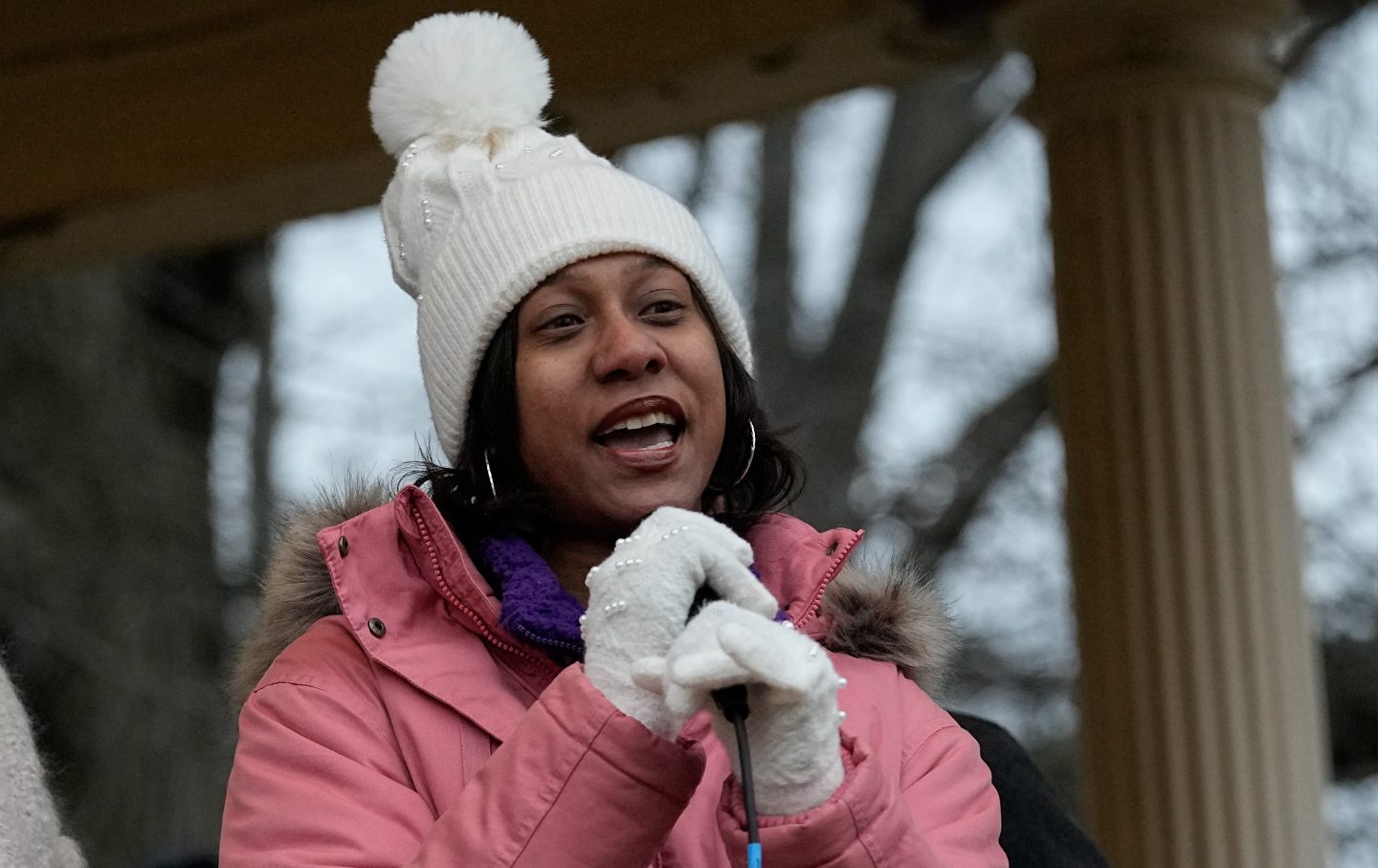What About Our Right to Life?
As we’re seeing now in tragic cases, abortion bans violate much more than just privacy rights.

The forecast for abortion rights in 2024 is dire. Despite important ballot initiatives in the past two years that have successfully enshrined abortion rights in several states’ constitutions, a new “Jane Crow” has emerged. Since the Supreme Court’s decision in Dobbs v. Jackson Women’s Health Organization overturned the legal right to abortion in June 2022, 21 states have imposed abortion bans, including 14 states that banned abortions outright and two others that have imposed restrictions at various points in pregnancy with no exceptions for rape or incest. With this chilling array of bans now in full force, it’s become abundantly clear that outlawing abortion threatens a range of constitutional freedoms, human rights, and civil liberties.
In October, 34-year-old Ohio resident Brittany Watts was charged with a felony following her miscarriage. Watts experienced vaginal bleeding and excruciating pain and faced the risk of sepsis, and doctors acknowledged that her pregnancy was not viable. But because of the state’s abortion ban, no one intervened to give Watts the care she needed. After she miscarried, police raided her home and destroyed her toilet in search of fetal remains.
In December, the Texas Supreme Court issued a late-night order blocking a lower court’s decision to permit Kate Cox’s abortion. Cox, a 31-year-old mother of two, was pregnant with a 20-week nonviable fetus diagnosed with trisomy 18—a condition that risked her life and her chances of ever getting pregnant again. Cox fled the state to receive the life-saving care she needed.
As appalling as they are, the Cox and Watts cases reflect only a sliver of the pandemonium, disorder, and cruelty unleashed in the aftermath of Dobbs. Reports of pregnant women bleeding for days without medical intervention, criminal prosecutions involving miscarriages, women suffering near-fatal conditions such as sepsis before fleeing their home states for care elsewhere, children forced to give birth after being raped, and people being denied abortions in cases involving nonviable fetuses or those deceased in utero are no longer uncommon. Indeed, the Fifth Circuit has now ruled that the federal Emergency Medical Treatment and Active Labor Act, which requires that any patient facing a medical emergency must receive the care necessary to save their life or stabilize their condition, does not apply when an abortion is the lifesaving treatment needed. This is a stunning blow to public health and safety, especially since EMTALA was specifically intended to address emergency matters during pregnancy.
This trail of horrors is nothing less than cruel and unusual, and these gross miscarriages of justice place women’s lives and health in grave danger. Post-Dobbs, depending on the state in which they live, pregnant people’s basic human and constitutional rights to life and liberty are now more illusory than real. For example, the 14th Amendment establishes that “all persons born or naturalized in the United States…are citizens” and that no state shall “deprive any person of life, liberty, or property.” However, post-Dobbs, none of these rights are guaranteed for pregnant women. In 1942, in Skinner v. Oklahoma, the Supreme Court invoked the 14th Amendment in unanimously declaring that a man’s right to reproductive autonomy is a human right and that state laws infringing on their reproductive rights would be struck down as violations of men’s fundamental civil rights. Eighty years later, with its ruling in Dobbs, the court restored the notion that women’s equality is contestable and that their right to bodily autonomy deserves lesser protection than a man’s.
Consider, too, the 13th Amendment’s prohibition of slavery and involuntary servitude. States that now force women and girls to sustain pregnancies, conscripting their bodies in service of legislative interests, regardless of their opposition and despite serious health risks, expressly contravene the amendment’s right to be free from involuntary servitude. Forced pregnancy pulls directly and indirectly from the heinous strategies of American slavery, whereby for centuries—over the objections of girls and women—their wombs served the interests of others.
In Texas and elsewhere, abortion bans that prohibit aiding and abetting individuals in the termination of a pregnancy directly implicate the First Amendment’s protection of free speech and association, potentially infringing on pregnant women’s ability to consult with their loved ones. The free speech of librarians has also become a target: In Oklahoma, librarians were prohibited from using the term “abortion” with patrons or assisting them with searches on the subject. Violations of the policy carried a risk of a $10,000 fine, jail time, and employment termination.
The Fourth Amendment, which safeguards the right to privacy, shielding Americans from unlawful searches and seizures, was already compromised before Dobbs by prosecutors’ policing of Black women’s pregnancies, leading to stunning cases of women’s medical records, tests, and confidential communications with their medical providers being seized by police and weaponized by the state. In 2001, Regina McKnight, a poor, young Black woman from South Carolina, became the first person in the United States to be prosecuted and convicted of murder for having a stillbirth after private patient information was used against her. Five years later, Rennie Gibbs, a 16-year-old Black teenager from Mississippi, was charged with “depraved heart murder” in the case of her stillbirth after it was revealed that she had disclosed drug use to her physicians. The surveillance of pregnant women and girls and the weaponization of criminal and civil punishments to enforce abortion bans will undoubtedly ramp up in 2024. This is already taking shape: In Nebraska, law enforcement searched the Facebook accounts of a mother and daughter on suspicion that the daughter had obtained an illegal abortion. Both were later prosecuted and sentenced.
These violations of life and liberty are occurring in a context in which the United States ranks last among developed nations on matters of maternal mortality and morbidity. Antiabortion lawmaking and judicial rulings have not only decimated abortion rights across the nation but threaten the rule of law itself by trampling myriad other constitutional freedoms too, showing an appalling disregard for women’s right to life and human dignity.








